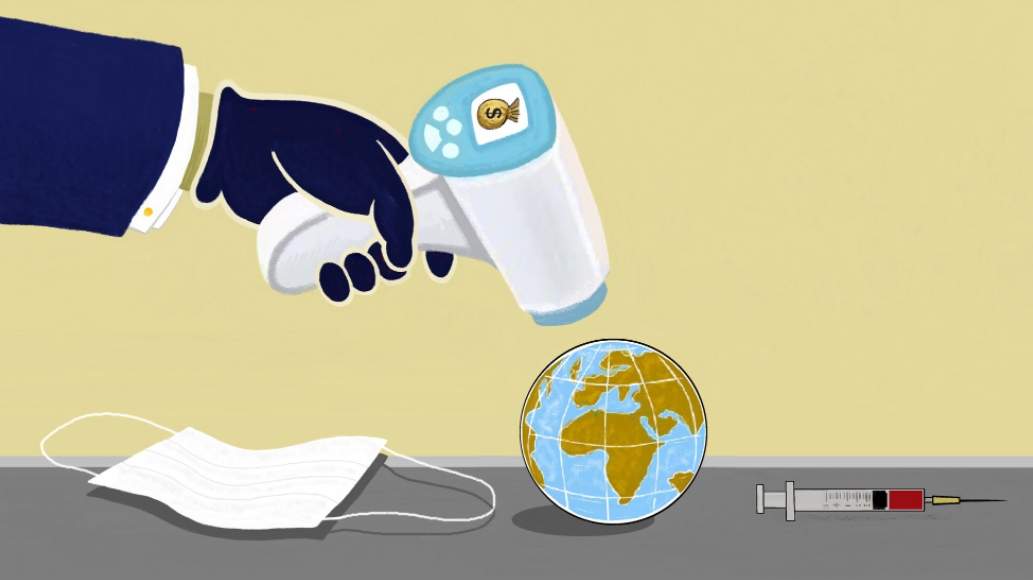
Coordinated regional and global efforts are needed to combat corporate corruption and tax evasion on the continent. It is told by the authors of the book ‘On the trail of capital flight from Africa
Alpha, beta, gamma, delta, omicron… how many more letters of the Greek alphabet, which symbolize the variants of covid-19, will the world have to endure? While southern Africa was once again the victim of ultimately unnecessary and unfair border closures late last year, a handful of rich countries continue to oppose the demand to lift patents on vaccines and treatments against the virus. . Of course, this vaccinal selfishness is taking its toll on poor countries, but it has also been booming back to more affluent ones, with new waves of the virus.
This cynicism and blindness are also reflected in the financial flows between North and South. In theory, rich countries multiply development aid and direct investment in Africa. In reality, they turn a blind eye to an international system that systematically plunders the continent for the benefit of an elite and big business. In the last five decades, sub-Saharan Africa has lost more than two trillion dollars due to capital flight. The hemorrhage has accelerated since the turn of the century, averaging $65 billion a year, a sum that exceeds the annual inflow of official development assistance.
In the imaginary world of a perfect market economy, natural resources would be a boon and capital would flow to countries where it is most scarce. Africa would be a net recipient. The Angolan people would reap the benefits of oil extraction; the Ivorians would prosper as the world’s leading exporter of cocoa (45% of world production); and South Africans would enjoy the fruits of the abundance of minerals.
This is not happening. Natural resources are instead a hunting ground for rapid wealth extraction and offshore accumulation. Cross-border capital flows are not driven by relative scarcity in Africa, but by the secrecy provided in tax havens. Foreign loans are often ruinous and unprofitable, when they don’t evaporate into thin air. In the Mozambique hidden debt scandal, for example, a $2 billion loan (equivalent to 12% of GDP) that was arranged by government officials, European bankers and Middle Eastern businessmen never reached the African country and, however, you are required to pay it back with interest.
In Angola, oil extraction has only served to enrich the elite and the oil multinationals
In Angola, oil extraction has only served to enrich the elite and the oil multinationals. From 1986 to 2018, the country lost $103 billion to capital flight, a sum equal to the country’s GDP in 2018. Meanwhile, only 7% of Angolans in rural areas have access to electricity and nearly half of the population lacks access to basic drinking water and sanitation services.
Most cocoa farmers in Côte d’Ivoire live below the poverty line, while capital flight has been estimated at $55 billion between 1970 and 2018. In the same period, some $329 billion has vanished dollars in South Africa, with the systematic under-invoicing of mineral exports being the main cause of the poor results in terms of growth, savings, domestic investment and poverty reduction, in which it is described as “the most unequal country in the world ”.
We reveal these figures in our latest book On the Trail of Capital Flight from Africa. The Takers and the Enablers (On the trail of capital flight from Africa), published by Oxford University Press at the end of January 2022, through three examples: Angola, Ivory Coast and South Africa, countries rich in natural resources but with disappointing development results.
Beyond the statistics, we show how national elites have the help and complicity of external banks, accountants and consultants to orchestrate the flight of capital from African countries. The policy of the resource curse undermines the fiscal contract between the state and the people. When the state derives most of its income from parastatal monopolies, supplemented by foreign loans, its main constituencies become its foreign collaborators rather than its own citizens.
And only by really putting an end to the plundering of the resources of the South will we allow countries to develop and avoid social explosion and forced migration
Coordinated regional and global efforts are needed to combat capital flight, corruption and corporate tax evasion. The courageous work of the International Consortium of Investigative Journalists and other organizations has shed light on the underground networks of profiteers and facilitators.
Much remains to be done and ambition falls short of need, as evidenced by the adoption of a global tax deal imposed by rich countries last October. Its main measure – a global corporate tax of just 15% – demonstrates that Northern capitals continue to respond more to the rhetoric of multinationals than to the needs of developing countries. The Independent Commission for the Reform of International Corporate Taxation (ICRICT), of which I am a member along with economists such as Thomas Piketty, Gabriel Zucman, José Antonio Ocampo and Jayati Ghosh, advocated a rate of 25% that would recover most of the 240,000 million dollars that are lost each year for what is modestly called tax optimization. In contrast, a rate of 15% would not generate more than 150,000 million dollars of additional resources per year, most of which would be captured by the rich countries.
As in the case of the covid-19 vaccine, it is a very short-term calculation. Only solidarity around immunization will stop the variants that would otherwise prolong this pandemic indefinitely. And only by truly ending the plundering of the South’s resources will we allow countries to develop and prevent social explosion and forced migration. It is also the only way to allow them to face the climate emergency, with positive consequences for all.
